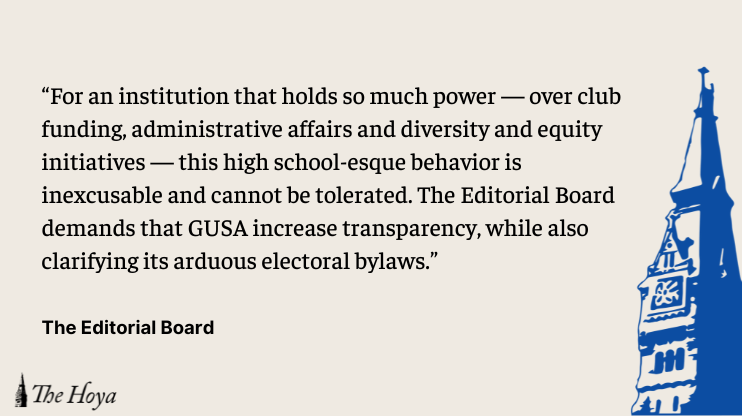As Washington, D.C. erupts in chaos, with the House of Representatives finding itself in an unprecedented speaker-less state, the Georgetown University Student Association (GUSA) similarly finds itself mired in controversy.
On Sunday, Oct. 8 at 11 a.m., the results of the recent GUSA executive race were released, with Jaden Cobb (CAS ’25) and Sanaa Mehta (SFS ’25) winning the election in a landslide.
Nevertheless, just six hours later, the election was left in turmoil following the GUSA Senate’s failure to certify its results. This prompted GUSA President Camber Vincent (SFS ’24) to announce a second “special election” for executive, which will take place from Oct. 19 at 8 p.m. to Oct. 20 at the same time.
In the initial election, which ran Oct. 5 to 7, Cobb and Mehta garnered 827 votes, 112 more than the two other tickets — Saatvik Sunkavalli (SFS ’25)-Andrea Li (SFS ’26) and Axel Abrica (CAS ’25)-Sebastian Cardena (CAS ’26), plus the write-ins — combined.
However, allegations of election fraud marred the decisive result, forcing a testy certification vote in the GUSA Senate.
The Editorial Board condemns GUSA for its historic, recurring electoral disasters that have undermined and continue to undermine faith in student government at Georgetown.
In their certification vote, the senate was primarily concerned with the period lasting from 11 a.m. to 3 p.m. on Oct. 6, the second day of voting. During these hours, the Cobb-Mehta team allegedly operated an electronic voting station in Red Square. This was found to be a direct violation of bylaw 16.04, which states that candidates and their teams cannot set up voting stations with electronic devices on election day.
According to emails obtained by The Hoya, the Cobb-Mehta team tabling in Red Square was warned by the Election Commission (EC) multiple times on this matter. Nonetheless, the ticket failed to comply, and the EC responded by banning them from campaigning for the last 24 hours of the election period.
After reviewing this evidence, only 11 senators voted to certify the election, falling short of the necessary two-thirds, 15-person threshold set by GUSA.
Manahal Fazal (SFS ’24), the speaker of the senate, spoke to The Hoya regarding her decision.
“Do I believe that [the election fraud allegations] would’ve changed the results? Probably not. But it was unfair, and because of that I did vote no to certify it,” Fazal said.
When a vote was raised to decertify the election, the proposal failed by the same margin, triggering the aforementioned special election.
In addition, the EC was informed by the Abrica-Cardena campaign that Cobb had allegedly harassed and bullied supporters of their ticket. Although the EC declined to publicly sanction the campaign, the commission recommended that the Abrica-Cardena report the behavior to the Office of Student Conduct.
Moreover, both the Abrica-Cardena and Sunkavalli-Li tickets expressed frustration that the EC failed to adequately explain how the Cobb-Mehta campaign was punished for its unlawful tabling.
Inconsistent and ambiguous messaging internally and externally have been a continual thorn in GUSA’s side — when communicating both policy successes and electoral failures, as seen this past election.
The Editorial Board calls on GUSA to increase electoral communication among itself and with the student body. The lack of transparency regarding the allegations — from broken bylaws to bullying — derived from this year’s election cycle is unacceptable.
This weekend’s ridiculous and laughable failure in coming to a consensus is nothing new for GUSA.
Two years ago, GUSA held a referendum to abolish the entire senate and executive, but even then, student turnout wasn’t high enough to certify the results in favor of abolition.
More recently, in spring 2022, the EC urged the senate to decertify the GUSA election, following accusations that the victors traded alcohol for votes, a definitive breach of the bylaws. Nevertheless, the senate refused to follow the guidance of the commission and ultimately voted to certify the election, with the understanding that an impeachment inquiry would be opened immediately.
This year’s electoral crisis is merely one act in an ongoing drama that has caught the attention of an audience outside Georgetown.
The Washingtonian — a reputable D.C. magazine — even picked up the story of GUSA’s fantastical dysfunction, writing that “Scandals abound. Voters grow nihilistic. The candidate with the most votes doesn’t win.” Although written last fall, these words are eerily relevant today.
Even GUSA can’t take itself seriously.
“During the meeting, I did see other senators laugh. And I know I was kind of monitoring the group chat as well, and I know some of them made certain comments. I think that was inappropriate,” Fazal said.
Students are accordingly disengaged from their on-campus representation because they have become accustomed to seeing promises unfulfilled and watching the sad, albeit entertaining, theatrics carried out.
For Anjali Ofori (CAS ’27), this scandal is her first exposure to GUSA and its incompetence.
“I had no idea what GUSA really was until the election scandal, so it’s a really bad first impression. They’re also gaining a bad reputation since this keeps happening, which decreases students’ trust in GUSA,” Ofori said.
And the worst part is GUSA, despite its reputation, can bring real change on the Hilltop — from weekend GUTS buses to laptop loans, initiatives carried out by the current Vincent-Alyssa Hirai (SFS ’24) administration.
For an institution that holds so much power — over club funding, administrative affairs and diversity and equity initiatives — this high school-esque behavior is inexcusable and cannot be tolerated.
The Editorial Board demands that GUSA increase transparency, while also clarifying its arduous electoral bylaws. Administrative gridlock ultimately decreases both faith in student government and voter turnout in future elections.
The Hoya’s Editorial Board is composed of six students and is chaired by the opinion editors. Editorials reflect only the beliefs of a majority of the board and are not representative of The Hoya or any individual member of the board.














